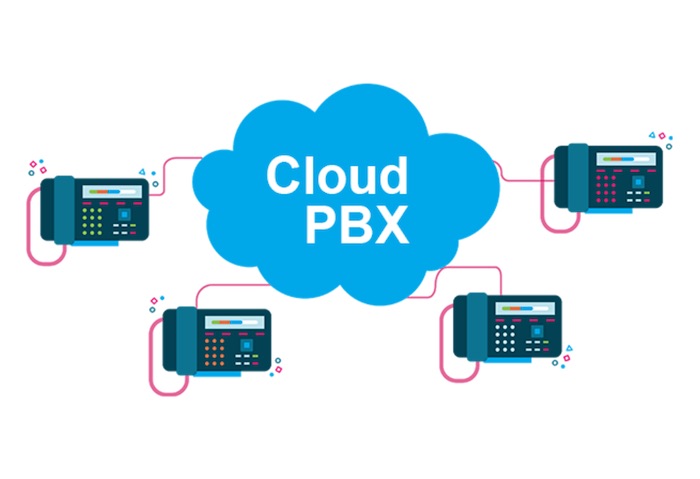In recent months it has become clear that reliable, flexible channels of communication are crucial for businesses. These channels make it possible for teams to work remotely, and for company representatives to stay in touch with customers.
Business phone systems based on Cloud PBX offer precisely the kind of features a modern business needs. These solutions provide scalable and adaptable alternatives to unwieldy traditional business phone services.
Here’s a run-down on what exactly Cloud PBX is, how it works, and how it can help you take your business communication to the next level.
What is Cloud PBX?
PBX stands for ‘private branch exchange’. This legacy technology is used to split up phone lines into several extensions in offices. Most physical PBX systems are cumbersome tangles of hardware that take dedicated office technicians to maintain.
Worst of all – it’s impossible to use these systems remotely.
Modern PBX systems, on the other hand, are cloud-based.
Voice over Internet Protocol (VoIP) technology has allowed business telephony to shift online. Voice and video call signals are no longer transmitted through traditional phone lines, but as data packages through the web.
A cloud PBX fulfills the same basic function as its last-century equivalent: It manages phone extensions for businesses. However, there is no physical PBX hunkering in a corner of an office. Instead, a virtual version lives on the telephony provider’s cloud server.
But how exactly does this benefit your business?
It’s cheap and easy to set up and maintain
First up, a virtual PBX cuts costs.
VoIP business phone services can be accessed via softphone apps on smartphones, tablets, and computers. That means there are no up-front hardware or software costs for your business’ phone system.
In addition, you won’t have to pay a phone technician to crawl under desks and install additional lines every time you hire someone new. With Cloud PBX, adding, removing, or modifying extensions is a matter of a few clicks in a web dashboard.
Finally, calls via VoIP and Cloud PBX are generally cheaper than landline-based ones. Especially if your business operates internationally.
It’s ready for remote work
During COVID-19 lockdowns, customers calling companies that still operate using legacy PBX were likely greeted by an unsatisfactory voicemail message. “Our office is currently not staffed -”
Cloud PBX is ready for remote work – anywhere, at any time.
No matter if your team is office-based, partly work-from-home, or fully distributed – Cloud PBX makes seamless communication possible.
Team members can use an app to access their business phone. To customers or colleagues calling, it makes no difference whether they are at their desk, on a business trip, or on their couch in their pajamas.
It offers more than just phone calls
Most modern business phone services don’t limit themselves to voice calls.
Instead, Cloud PBX offers a wide range of communication channels and additional tools to help boost your business’ productivity and efficiency.
The majority of modern VoIP providers offer multichannel communication. This includes voice and video calling, conferencing, text messaging, and live chat. Some also throw in email and chatbot functionalities.
Having all these channels in one place has several advantages.
For one, it cuts down on the number – and cost – of subscriptions to different services.
For another, it boosts productivity. Team members don’t have to switch apps constantly or monitor five different notification systems. They can focus on just one, which also makes it easier for them to maintain a coherent business identity.
In terms of additional features, modern Cloud PBX typically offers voicemail-to-email and voicemail-to-text transcription and advanced call management (routing, blocking, redirecting). Find-me-follow-me ensures you can take important calls no matter where you are.
Providers also increasingly include features powered by artificial intelligence (AI) and machine learning algorithms. These range from advanced analytics that give you in-depth, actionable insights into caller behavior and team performance to Interactive Voice Response (IVR).
Advanced IVR uses natural language processing to speed up the routing of customer calls. Instead of suffering through five rounds of “Press 1 for -”, callers simply state their purpose. The AI analyzes their request and forwards them to the right extension.
It integrates with other business apps
A final major advantage is that Cloud PBX can slot seamlessly into your existing ecosystem of business apps.
Chances are, your team is already working with Customer Relationship Management (CRM) systems like HubSpot or Salesforce, or team collaboration platforms like Slack.
Many VoIP providers offer native integrations for these business apps. This means data moves smoothly from one to the other, maximizing workflow efficiency.
For example, if a customer calls about a problem with a product, a Cloud PBX can autonomously pull data on previous interactions from a CRM. Company representatives can continue where their colleagues left off during the last call – and the customer won’t have to give a “best of” of previous exchanges.
Conclusion
Cloud PBX is without doubt the future of business telephony.
Legacy systems are no longer adapted to the pace and demand for flexibility shaping the modern business world.
By providing a reliable, versatile, and scalable basis for multichannel business communication, Cloud PBX has become a valuable investment for any company. With the right Cloud PBX provider for your business, you can streamline workflows, increase communication efficiency, and forge your path to success.
Disclosure: We might earn commission from qualifying purchases. The commission help keep the rest of my content free, so thank you!




